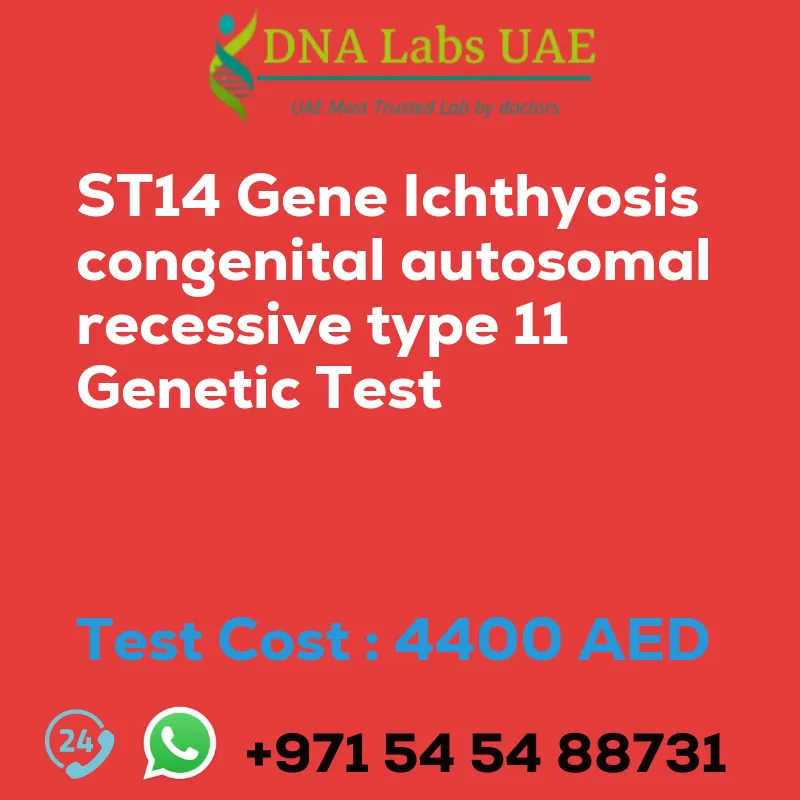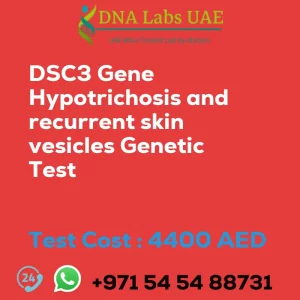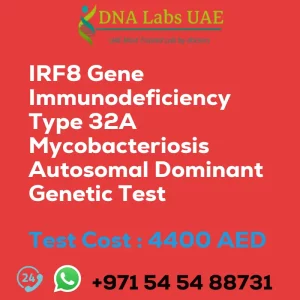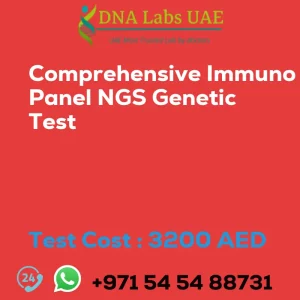ST14 Gene Ichthyosis Congenital Autosomal Recessive Type 11 Genetic Test
Welcome to DNA Labs UAE, a leading genetic laboratory in the United Arab Emirates. In this blog post, we will discuss the ST14 Gene Ichthyosis Congenital Autosomal Recessive Type 11 Genetic Test, including its cost, symptoms, diagnosis, and other important details.
Test Name: ST14 Gene Ichthyosis Congenital Autosomal Recessive Type 11 Genetic Test
Components:
- Price: 4400.0 AED
Sample Condition:
Blood or Extracted DNA or One drop Blood on FTA Card
Report Delivery:
3 to 4 Weeks
Method:
NGS Technology
Test Type:
Osteology Dermatology Immunology Disorders
Doctor:
Dermatologist
Test Department:
Genetics
Pre Test Information:
Clinical History of Patient who is going for ST14 Gene Ichthyosis, congenital, autosomal recessive, type 11 NGS Genetic DNA Test. A Genetic Counselling session to draw a pedigree chart of family members affected with ST14 Gene Ichthyosis, congenital, autosomal recessive, type 11 NGS Genetic DNA Test gene ST14
Test Details:
The ST14 gene is associated with a type of ichthyosis called congenital ichthyosis, autosomal recessive, type 11. This condition is inherited in an autosomal recessive manner, meaning that both copies of the ST14 gene must be mutated for an individual to be affected.
NGS (Next-Generation Sequencing) genetic testing is a method used to analyze multiple genes simultaneously and identify mutations or variants that may be associated with a particular condition. In the case of ST14 gene ichthyosis, NGS genetic testing can be used to detect mutations in the ST14 gene that may be causing the condition.
The genetic test involves obtaining a DNA sample, usually through a blood sample or cheek swab, from the individual being tested. The DNA is then sequenced using NGS technology, which allows for the identification of variations in the ST14 gene. These variations can include small changes in the DNA sequence, such as single nucleotide changes (SNPs), insertions, deletions, or larger structural changes.
By identifying mutations or variants in the ST14 gene, NGS genetic testing can help confirm a diagnosis of congenital ichthyosis, autosomal recessive, type 11. It can also provide information about the specific genetic changes involved, which can be useful for genetic counseling and family planning.
It’s important to note that NGS genetic testing is just one tool used in the diagnosis of genetic conditions. Clinical evaluation, medical history, and other diagnostic tests may also be necessary to confirm a diagnosis. Additionally, genetic testing should always be performed and interpreted by qualified healthcare professionals who specialize in genetics.
| Test Name | ST14 Gene Ichthyosis congenital autosomal recessive type 11 Genetic Test |
|---|---|
| Components | |
| Price | 4400.0 AED |
| Sample Condition | Blood or Extracted DNA or One drop Blood on FTA Card |
| Report Delivery | 3 to 4 Weeks |
| Method | NGS Technology |
| Test type | Osteology Dermatology Immunology Disorders |
| Doctor | Dermatologist |
| Test Department: | Genetics |
| Pre Test Information | Clinical History of Patient who is going for ST14 Gene Ichthyosis, congenital, autosomal recessive, type 11 NGS Genetic DNA Test. A Genetic Counselling session to draw a pedigree chart of family members affected with ST14 Gene Ichthyosis, congenital, autosomal recessive, type 11 NGS Genetic DNA Test gene ST14 |
| Test Details |
The ST14 gene is associated with a type of ichthyosis called congenital ichthyosis, autosomal recessive, type 11. This condition is inherited in an autosomal recessive manner, meaning that both copies of the ST14 gene must be mutated for an individual to be affected. NGS (Next-Generation Sequencing) genetic testing is a method used to analyze multiple genes simultaneously and identify mutations or variants that may be associated with a particular condition. In the case of ST14 gene ichthyosis, NGS genetic testing can be used to detect mutations in the ST14 gene that may be causing the condition. The genetic test involves obtaining a DNA sample, usually through a blood sample or cheek swab, from the individual being tested. The DNA is then sequenced using NGS technology, which allows for the identification of variations in the ST14 gene. These variations can include small changes in the DNA sequence, such as single nucleotide changes (SNPs), insertions, deletions, or larger structural changes. By identifying mutations or variants in the ST14 gene, NGS genetic testing can help confirm a diagnosis of congenital ichthyosis, autosomal recessive, type 11. It can also provide information about the specific genetic changes involved, which can be useful for genetic counseling and family planning. It’s important to note that NGS genetic testing is just one tool used in the diagnosis of genetic conditions. Clinical evaluation, medical history, and other diagnostic tests may also be necessary to confirm a diagnosis. Additionally, genetic testing should always be performed and interpreted by qualified healthcare professionals who specialize in genetics. |








